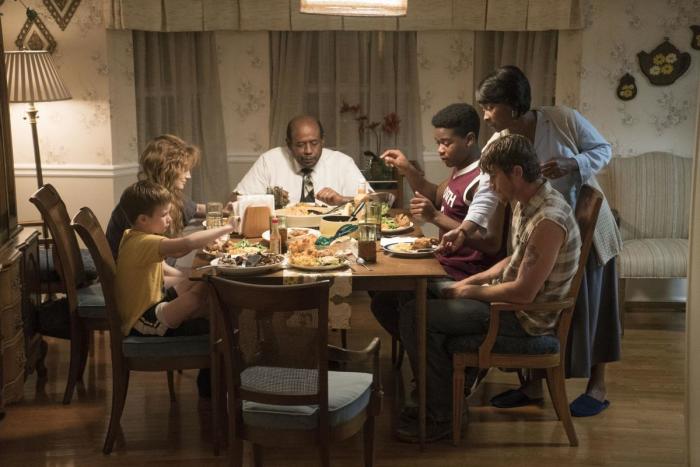'Burden' review: True story of Klansman and black preacher brings new meaning to 'love your enemies'

The Ku Klux Klan will forever be one of the greatest blights on the United States. The racial violence and hatred perpetrated by the white-hooded members of the notorious white supremacist group is permanently etched in the history of the nation.
Still, in today’s “woke” society, it’s easy to relegate the Klan to a thing of the past.
But in reality, the KKK isn’t exactly in the distant past. In fact, less than three decades ago, the KKK was active in a poverty-ridden town in South Carolina.
This is the painful reality filmmaker Andrew Heckler brings to light in his powerful new drama “Burden.”
Based on a true story, “Burden” is a deeply unnerving yet remarkably redemptive tale that asks audiences to examine their own prejudices, consider what it means to truly “love your enemies” (Matthew 5:44) and extend love, compassion, and forgiveness to the least deserving.
Starring Forest Whitaker, Tom Wilkinson, Usher, Garrett Hedlund, Andrea Riseborough and Austin Hebert, “Burden” is set in the mid-’90s and follows Mike Burden, a hot-headed young KKK member in Laurens, South Carolina. Through a series of flashbacks, Mike’s story becomes clear: Orphaned at a young age and mired in poverty, Mike was taken in and mentored by Tom Griffin, a white supremacist who presides over frequent KKK gatherings.
Griffin all-too-happily indoctrinates his young pupil with hateful and racist rhetoric. In one particularly telling scene, he gives a young Mike and other boys Bowie knives and teaches them how to shank “dark meat.” Barbecues and lighthearted “family” hangouts are rife with racist jokes and on occasion, morph into full-blown KKK rallies, complete with burning crosses and white hoods.
To Mike, the Klan isn’t just normal; it’s family.
Eventually, Griffin gifts Mike his prized possession — an old theater in the small downtown area of Laurens. Under Griffin’s guidance, Mike and his cronies transform the theater into ”The Redneck Shop,” loudly decorated with a Confederate flag. The back half of the shop is occupied by the “KKK Museum,” filled with KKK paraphernalia including white-hooded Klan uniforms and photographs of lynchings.
While working his part-time gig as a repo man, Mike meets and falls in love with Judy Harbeson, a down-on-her-luck lady with a young son, Franklin. But for Judy, who holds significantly more progressive views on interracial relations, Mike’s affiliation with the KKK is a deal-breaker.
Meanwhile, local preacher Reverend Kennedy, whose uncle was lynched by the KKK, is on a mission to close the Redneck Shop and KKK Museum through prayer and peaceful protest.
In one scene, Kennedy recounts the atrocities carried out against black community members by the KKK — and reminds his congregation, “but in the midst of it all, Jesus Christ said, ‘Love thy enemies.’ But when it’s time to fight, we will fight. Jesus Christ said, ‘Rebuke evil.’ And the redneck shop is evil.”
On the day of Kennedy’s protest, Mike is unable to follow through on Griffin's order to attack and ends up being ostracized from his family and homeless.
Ever the Good Samaritan, Reverand Kennedy offers to take them in and receives pushback from his community, wary of a former KKK member in their midst.
When a reluctant hotel owner asks the pastor, “Do you know who that man is?” Kennedy replies, “I know him as a brother in Christ.”
But the story doesn’t end there, and Mike’s path to redemption isn’t easy. He struggles to rely on people he once hated for his livelihood and experiences a series of setbacks. For him, acknowledging his own wrongdoing isn’t easy. At one point, Reverend Kennedy tells him, “You must take responsibility for your actions. Then, you can repent and find redemption.”
But in the end, Mike’s heart is transformed by the forgiveness, compassion, and kindness shown to him by those he once loathed. In a powerful closing scene, Kennedy baptizes Mike in the river while the community looks on.
“I’ve done a lot of bad things in my life, things I now regret. I’ve hurt a lot of people. ... I was going to kill your preacher,” Mike confesses. “Here I am, standing before you, a man that can’t go back because I don’t want to. I want you to know I’m sorry … and maybe you all can forgive me. I hope God can forgive me.”
Though a powerful story of redemption, faith, and healing, “Burden” is not a faith-based film nor is it easy to watch. The acts of racial violence carried out by white supremacists are heartbreaking. In one scene, men pile into a pickup truck and urinate on a black woman trying to walk home. The derogatory term n----- is also frequently thrown around by white supremacists, along with f---, s---, d---, and other crass terms.
However, the film won the Sundance Film Festival’s Audience Award for best U.S. dramatic film in 2018 for good reason. On the surface, “Burden” is a story of small-town Southern racism and the heroism of several key individuals. But in reality, it’s a wider story of poverty, a deeply flawed socioeconomic system, and the transformative power of the Gospel.
Heckler, who spent nearly a decade researching and writing “Burden,” treats his characters with compassion, highlighting their humanity while refusing to let them off the hook. He challenges viewers to love their enemies while acknowledging that following Christ isn’t easy, pain is real, and faith is difficult.
Yet “Burden” highlights the biblical reality that no matter how flawed, no one is beyond redemption and the Gospel can soften even the hardest of hearts. Although difficult to watch, “Burden” is a timeless story of hope and reconciliation, a much-needed reminder in today’s increasingly divided society.
From 101 Studios, “Burden” is set for limited national release in Los Angeles and New York City on Feb. 28, with plans to expand screenings to other cities.





























